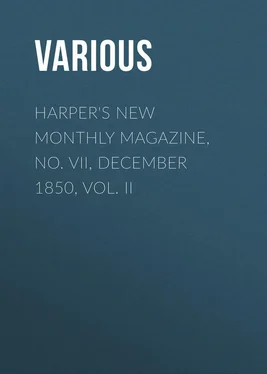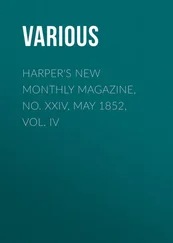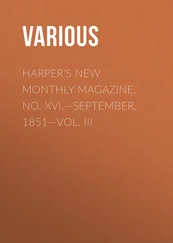Various - Harper's New Monthly Magazine, No. VII, December 1850, Vol. II
Здесь есть возможность читать онлайн «Various - Harper's New Monthly Magazine, No. VII, December 1850, Vol. II» — ознакомительный отрывок электронной книги совершенно бесплатно, а после прочтения отрывка купить полную версию. В некоторых случаях можно слушать аудио, скачать через торрент в формате fb2 и присутствует краткое содержание. Издательство: Иностранный паблик, Жанр: periodic, foreign_edu, на английском языке. Описание произведения, (предисловие) а так же отзывы посетителей доступны на портале библиотеки ЛибКат.
- Название:Harper's New Monthly Magazine, No. VII, December 1850, Vol. II
- Автор:
- Издательство:Иностранный паблик
- Жанр:
- Год:неизвестен
- ISBN:нет данных
- Рейтинг книги:4 / 5. Голосов: 1
-
Избранное:Добавить в избранное
- Отзывы:
-
Ваша оценка:
- 80
- 1
- 2
- 3
- 4
- 5
Harper's New Monthly Magazine, No. VII, December 1850, Vol. II: краткое содержание, описание и аннотация
Предлагаем к чтению аннотацию, описание, краткое содержание или предисловие (зависит от того, что написал сам автор книги «Harper's New Monthly Magazine, No. VII, December 1850, Vol. II»). Если вы не нашли необходимую информацию о книге — напишите в комментариях, мы постараемся отыскать её.
Harper's New Monthly Magazine, No. VII, December 1850, Vol. II — читать онлайн ознакомительный отрывок
Ниже представлен текст книги, разбитый по страницам. Система сохранения места последней прочитанной страницы, позволяет с удобством читать онлайн бесплатно книгу «Harper's New Monthly Magazine, No. VII, December 1850, Vol. II», без необходимости каждый раз заново искать на чём Вы остановились. Поставьте закладку, и сможете в любой момент перейти на страницу, на которой закончили чтение.
Интервал:
Закладка:
In this dangerous yet undecided state of affairs, Sir Valentine one morning, breakfasting at his club in Waterloo Place, read in a newspaper a notice of the grand mining operation and explosion that was to take place at Seaford, the object of which was to throw down an immense mass of chalk cliff, the broken fragments whereof would, at a comparatively small cost, form a sea-wall, at an elevation of about one-fifth the height of the parent rock. Why, here was Sir Valentine's own case! His house was upon a very high chalk rock, and a sea-wall of one-fifth the height would answer every purpose. The only difficulty was his present proximity to the edge of the cliff. Still, he thought he could spare thirty feet or so, without losing his door-steps, and this width being exploded down to the base of the cliff, would constitute, by its fall, a very capital mound of protection which might last for a century or more. He therefore determined to see the explosion at Seaford, and if it proved successful, to adopt the very same plan.
Sir Valentine, accordingly, on the nineteenth of September, swallowed an early cup of chocolate, and hurried off to the Brighton railway terminus, and took his place in the Express train for Newhaven. It was a return-ticket, first class, for which he paid the sum of one pound four shillings. An Excursion train had started at nine o'clock, the return-ticket first class, being only eleven shillings; but Sir Valentine fearing that it would stop at every station on the way, and might not be in time for the great event, had prudently chosen the Express at Express price; namely, one pound four per ticket. There was some confusion in the arrangements of the terminus, apparently attributable to extensive additions and alterations in the buildings; but there was no difficulty in receiving the money.
The train started; its speed, though an Express, being nothing particular. When it arrived at Lewes, the passengers all had to alight, and wait for another train which was to take them on. At last a train arrived. It was declared to be full!
"Full!" cried Sir Valentine, "why, I have paid for the Express! – first-class – one pound four."
Full, however, this long train was. Presently a guard shouted that there was room for three in a second-class carriage.
"I secure one!" shouted Sir Valentine, holding up his fore-finger in a threatening manner to the guard, and jumped in. In due time, and by no means in a hurry, the "Express" train arrived.
Out leaped Sir Valentine, and demanded of the first person he met how far it was to Seaford? The man said he didn't know! to the utter astonishment and contempt of the excited knight. He asked the next person; who replied that he hadn't the very least idea, but they could tell him at the "tap." Sir Valentine looked on all sides to see if there were any cabs, flies, or vehicles of any kind, and descrying several in a group at some little distance, made toward them at long running strides – a boy who had overheard his question as to the distance, following at his heels, and bawling – "Two miles as a crow flies! – four miles by the road! – two miles as a cro-o-o-o! – four by the ro-o-o-o!"
Arrived amidst the vehicles, the knight found nearly all of them either engaged, or full, and it was only as a matter of favor that he was admitted as "one over the number," to the inside of a small van without springs; where, beside the heat and crushing, he had to endure a thorough draught and three short pipes, all the way.
The road wound round the base of a series of hills and other rising ground, and a line of vehicles might be seen all along this serpentine road, for two or three miles' distance; while a long unbroken line of pedestrians were descried winding along the pathway across the fields. After a very jolting and rumbling drive, Sir Valentine found himself "shot out" with the rest of the company, in front of a small "public" knocked up for the occasion, with a load or two of bricks and some boards, and crowded to excess. Private carriages, flies, cabs, carts, wagons, vans, were standing around, together with booths and wheelbarrows, set out with apples, nuts, bread and cheese, and ginger-beer of a peculiarly thin stream. Sir Valentine having breakfasted early, hastily, and lightly, was by this time – a quarter to two – extremely sharp set; he endeavored, therefore, to make his way into the house to get a bottle of stout and some ham or cold beef for luncheon. But after ten minutes' continuous efforts, he found he was still between the door-posts, and the noisy, choked-up window of the "bar," as far from his hopes as ever. He abandoned the attempt in disgust – but not without addressing himself to a seafaring man who was standing with his hands in his pockets, looking on:
"Is this sense?" said the knight. "Do you call this common sense? Do you think you are acting with any more reason than a dog possesses, to treat the public in this way? Then, your own interest – look at it!" (pointing to the crowd struggling in the door-way). "If you had any foresight, or a head for the commonest arrangements, would you not have a barrel of ale on wheels outside here?"
The seafaring man swung round on his heel with a smile, and Sir Valentine, having made his way into the field, obtained six pennyworth of gingerbread and a dozen of small apples, with which provender he in some sort revived his exhausted frame. He now bustled on toward the foot of a broken embankment leading up to a lofty rising ground, the summit being the cliffs, a large portion of which was shortly to be detached, and thrown down by the explosion of a mine. The part to be blown off was marked out by broad belts of white, where the chalk had been thrown up, which made an imposing appearance even on the distant heights.
The sun shone brightly. All over the fields and fallow ground that lay between the halting-place just described, and the foot of the steep mount, the visitors were scattered – pedestrians, with here and there a horseman; sight-seers – the old and the young – men of science from various parts of the world – infantry soldiers, sappers and miners, ladies and gentlemen, sailors, marines, country people, railway laborers, policemen, boys and girls, and – far in the rear of all, with disapproving looks – two or three old women in spectacles. Renovated by his gingerbread and apples, Sir Valentine made his way manfully up the steep grassy ascent of the hill, chalk mountain it might be more properly termed, and, in the course of a quarter of an hour, he found himself at the spot where the explosion was to take place.
It was a tolerably level surface, of some hundred yards in diameter. Transverse belts of excavated chalk, with several trenches and pits half filled up, marked out the huge fragment of the solid mass which was to be separated. The boundary was further indicated by small flagstaffs, and also by sentinels, who prevented any of the visitors from trespassing on the dangerous ground, whereon, of course, they all had a half-delightful tingling wish to perambulate, and to feel themselves liable to be blown to atoms by a premature explosion.
Beneath the part marked off by the flagstaffs and sentinels, at a great depth in the chalk rock, were buried many thousand (the Brighton Herald said twenty-seven thousand!) pounds of gunpowder, distributed in different chambers and galleries, one communicating with another by means of a platina wire. This wire was carried up through the rock into a little wooden house, in which certain chemical mysteries were being secretly carried on by engineer officers. There was a little window in front, out of which the mysterious officer now and then half thrust his head, looked out, with profound gravity, upon the belts of chalk on the space before him, and, without appearing to see any of the crowding visitors, withdrew from the window. Presently another officer came, and did the same. "Come like shadows," muttered Sir Valentine, "so depart!"
Читать дальшеИнтервал:
Закладка:
Похожие книги на «Harper's New Monthly Magazine, No. VII, December 1850, Vol. II»
Представляем Вашему вниманию похожие книги на «Harper's New Monthly Magazine, No. VII, December 1850, Vol. II» списком для выбора. Мы отобрали схожую по названию и смыслу литературу в надежде предоставить читателям больше вариантов отыскать новые, интересные, ещё непрочитанные произведения.
Обсуждение, отзывы о книге «Harper's New Monthly Magazine, No. VII, December 1850, Vol. II» и просто собственные мнения читателей. Оставьте ваши комментарии, напишите, что Вы думаете о произведении, его смысле или главных героях. Укажите что конкретно понравилось, а что нет, и почему Вы так считаете.












